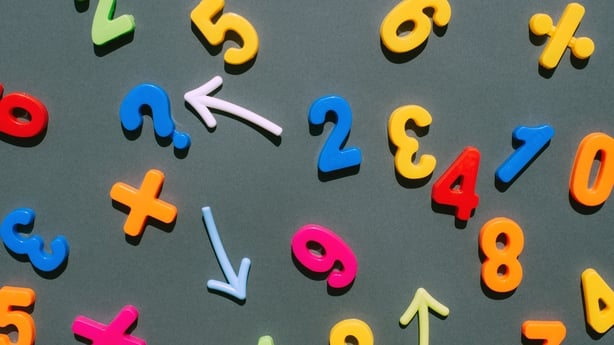Research shows that children as young as age three can develop an awareness of money, and by age seven, develop money habits for life.
But here in Ireland, are we giving young people the best start in life when it comes to their financial education?
Just yesterday, Minister for Finance Michael McGrath announced that the Department of Finance is developing Ireland's first National Financial Literacy strategy.
"I am deeply conscious of the benefits at a societal and individual level of strong financial literacy skills," Mr McGrath said.
The initial phase of the strategy aims to explore the levels of financial literacy and well-being of the population, and gather information on the existence of and access to financial literacy programmes across the population and specific subgroups.
Unlike other countries such as Sweden and Denmark, there is no dedicated financial literacy programme as part of either the primary or secondary school curriculum.
This could be one of the reasons why Ireland received a low financial literacy score of just 54% in a recent study by Bank of Ireland. In similar studies, the Nordic countries received scores of over 70%.
We need your consent to load this rte-player contentWe use rte-player to manage extra content that can set cookies on your device and collect data about your activity. Please review their details and accept them to load the content.Manage Preferences
Has the Government any plan to roll out a financial literacy programme in schools?
When asked if the Government has any plans to introduce a financial literacy programme into the school curriculum, a spokesperson for the Department of Education simply stated what is currently included in the curriculum.
"Across the education curriculum, at primary, Junior Cycle and Leaving Certificate levels, subjects such as maths, business, business studies, economics and accounting provide children and young people with an opportunity to develop their knowledge and skills in relation to financial literacy," the spokesperson said.
The spokesperson added that the updating of curricula is an "ongoing process".
"At Junior Cycle, the introduction of the Framework for Junior Cycle commenced in 2015 on a phased basis, with 2022 being the first year in which all subjects were examined under the Framework.
"At Senior Cycle, work on a reimagined Senior Cycle is ongoing, following on from the March 2022 announcement in this regard. A Programme Delivery Board and Partners' Forum is now in place and the first tranche of revised subjects will include Leaving Certificate Business," the Department of Education spokesperson added.
So simply put, the Department did not say it plans to introduce such a programme.
What is financial literacy?

Before we go any further, what actually is financial literacy?
"It is really about having the knowledge and skills to be able to make sound financial decisions about spending, saving, borrowing and planning," explained Dawn Bailey, Head of Financial Wellbeing at Bank of Ireland.
"20 years ago, that might have consisted of understanding the difference between a variable rate and a fixed rate, what compound interest is and how to use a chequebook, but today it encompasses a huge amount more."
Ms Bailey said it now involves understanding things like cryptocurrencies, buy now, pay later schemes, and risk versus return.
The financial literacy test carried out by Bank of Ireland showed that Ireland scored well on basic numericals, with 69% providing the correct answers in this section.
But knowledge of savings and tax relief was low, with just 37% of these questions answered correctly.
"People also tend to score badly on ways to reduce credit card interest," Ms Bailey added.
The results showed that those aged between 18 and 34 received the lowest score of just 48%, while those aged over 65 received the highest core of 58%.
So, why is Ireland scoring so low?

Financial literacy experts believe early intervention is key, and that schools should play a bigger part.
"Financial literacy should be introduced at primary school level," said Frank Conway, Founder of Moneywhizz, a company which develops financial education content for schools, and financial wellbeing content for employers.
He believes it should be introduced as a civic subject, where schools teach the basic concept of money using very simple language.
"This change needs to come from Government level," he said.
Mr Conway said children need to understand the terminology, and the workings of money from a young age, and believes that school is the ideal place for this to happen.
"Then young people would have more ammunition to prepare themselves.
"They would be better armed to make good financial decisions in the long term in order to build financial security for themselves and their families," he added.
While subjects such as maths, and business studies will go some way to educating young people about finances, Ms Bailey of Bank of Ireland argued that financial literacy is not a business studies skill.
"This is a life skill," she said.
Bank of Ireland has developed a number of financial literacy programmes for schools, with the help of financial literacy experts including Mr Conway of Moneywhizz.
The programmes are designed for children in both primary and secondary school.
Students at Our Lady's School in Terenure, County Dublin took part in one such programme, 'MoneySmarts', including fourth year students Matilda Murray, Ciara O'Loughran, Rachel Davis and Kathryn King.
The programme covers six key pillars of financial wellbeing: Spending and Saving; Earning and Income; Credit and Debt; Investing; Risk and Protection; and Financial Decision Making. There's also a presentation and video on fraud.
What do young people think?

Matilda Murray believes all students should be learning about their finances.
"I think you hear a lot of the buzzwords like inflation and interest rates, but you don't really know what they mean, so it's important to find out and investigate it," she said.
As part of the financial literacy programme, Matilda said they learned how to manage their money in real life.
"I feel like no one really teaches you that, you're just kind of expected to learn on your own," she added.
She has also set up her own bank account, which she thinks is an important step for young people.
"It gives you ownership of your money and you learn how to manage your money when you don't have the pressure of a big thing like trying to repay your mortgage or a loan or whatever.
"It's your own money that you can spend on things like clothes, shoes and going on holidays," she said.
Matilda would have liked to learn more about finances at an earlier age in primary school, with simple concepts such as a piggy bank.
Then in secondary school, she would like to see it introduced into the curriculum, in a class such as SPHE.
"SPHE is all about health and wellbeing," she said.
"Money definitely comes into wellbeing because it is a very important part of your future and if you don't know how to manage your money properly, it could really affect your wellbeing," she said.
Fellow fourth year student Ciara O'Loughran agrees.
"I think it would be important to do in primary school or in first and second year to teach people what to do with their money, because it's definitely something that people don't know enough about and people can make an awful lot of wrong decisions and end up in an awful situation," she said.
Lynsey Phelan is a business and accounting teacher at Our Lady's School Terenure.
She is planning to introduce the Bank of Ireland 'MoneySmarts' programme into the Transition Year curriculum for next year.
At the moment, the students take part outside of school hours, as an additional activity.
"What I really like about it is that it has a real-life application to it and in secondary school we're constantly trying to link in the real world into our class," Ms Phelan said.
She would like to see all students engage in financial literacy programmes, but added that it can be quite difficult at times to introduce extra elements to the curriculum.
Fancy testing your financial literacy?

The financial literacy test carried out by Bank of Ireland included 24 questions.
Below you will find four of the question included in the test, so why not test your knowledge.
- If you were offered a job with an annual salary of €60,000, what would be your monthly pay (before taxes and deductions)?
- Suppose you had €100 in a savings account and the bank adds 10% compounding per year to the account. How much money would you have in the account after five years if you did not remove any money from the account? Multiple choice: More than €150, exactly €150, less than €150
- Anna saves €500 each year for 10 years and then stops saving additional money. At the same time, Charlie saves nothing for 10 years but then receives a €5,000 gift which he decides to save. If both Anna and Charlie earn a 5% return each year, who will have more money in savings after 20 years?
- Paul and Mary both have €1,000 and decide to invest it over a five-year period. Paul visits an investment advisor and decides to buy shares in one company listed on the stock market. Meanwhile, Mary goes through an investment company and puts her money in a mutual fund. Who has the higher level of risk?
Answers

- €5,000
- More than €150
- Anna
- Paul







